Bringing closure to a series like Mad Men is no easy task. This exceptional television experience has brought characters we care about into our homes, and has recreated a decade which, through storytelling, has powerfully impacted contemporary culture.
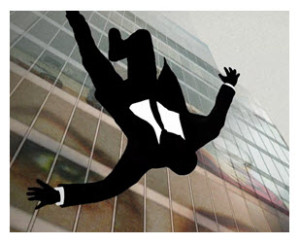 Saying goodbye to Mad Men, for its devotees, has been a process.
Saying goodbye to Mad Men, for its devotees, has been a process.
In preparing for the finale, I indulged in speculation on possible denouements, and then decided it was better to enjoy as much of the marathon rebroadcast of 90+ episodes as possible — rather than scouting out clues to Don Draper’s demise.
Saying Many Goodbyes
Leading up to the finale, “Person to Person,” I had the impression that I was readying for a teary farewell to friends who were moving overseas — a nice delusion, don’t you think? — enabling a little fiction of my own that I might someday encounter these friends again. And thanks to the magic of DVDs (or a subscription service), I can always invite Don, Peggy, Betty, Sally, Roger, Pete et al back into my living room for a few hours of their crusty, feisty, funny, flawed “reality.”
For those of us who were children in the 60s, one of the sources of sadness as Mad Men ends is the nostalgic pleasure of the set and costume details, visuals that have sparked precious recollections. But this was a tumultuous, transformative decade. Just as some of us lived through the unraveling of pretense that the country experienced in its violence, its chaos, and its disillusionment, we have supported a hero we love, hate, and cheer on — Dick Whitman turned Don Draper. We have been at his side battling demons, struggling to reconcile his misdeeds and, grabbing for the slippery American Dream, as he so often says from Season 1 on, determined to “move forward.”
So passed the 1960s, as all events, people and cultures do — moving forward, though with less intention that Don seemed to rally each time he, himself, fought for his own survival.
Most of us wondered if the show’s creator would simply kill off our protagonist in the end. (Was our way of life killed off entirely by 1970? Not so. Was the American Dream or our love of cars and Coke killed off in that time? Not so. Was the love of tobacco killed off — from “Smoke Gets in Your Eyes” as the series opener, all the way through Betty’s last scene, calmly smoking as she’s dying of lung cancer? Not so. Thank you, Matthew Weiner, for not smiting Don Draper.)
Yet didn’t our innocence disappear by the end of the decade? Hadn’t entire segments of the nation set foot into a collective encounter group, “retreating” to explore who we were, where we were, and how we were feeling? Wasn’t Don’s search for his identity the story of our society throughout the course of those divisive years? Who can’t relate to the challenges of repackaging ourselves, our communities, our country — or making real, profound changes?
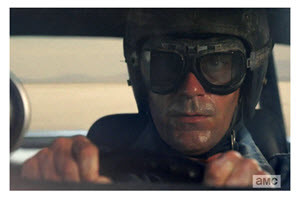 As I prepared for the finale, I paid particular attention to the show’s opening montage. Not only was our silhouetted ad man plummeting from a great height, but everything in the room in which he initially stands begins to fall away. Certainly, these seven seasons told us the story of an entire way of life, carefully constructed, that was rapidly crumbling.
As I prepared for the finale, I paid particular attention to the show’s opening montage. Not only was our silhouetted ad man plummeting from a great height, but everything in the room in which he initially stands begins to fall away. Certainly, these seven seasons told us the story of an entire way of life, carefully constructed, that was rapidly crumbling.
Don Draper, Where Are You?
As the finale begins, Don is in the desert, enjoying his own version of dropping out, test driving a car before “staking” two guys to a drag race in California. And so we see him make his way to Disney territory after all, his promised land in so many ways, but only after Sally breaks the news to him on the phone that Betty has six months to live.
The brief conversation he has with his ex-wife is poignant and painful. We see Betty sick, Don sick at the thought that she will be gone, his immediate reaction which is to go home and take care of the kids, and her insistence that he not do exactly that. She has her mind made up how she wants the boys raised, by her brother, and while the viewing audience may recall him as a prissy and privileged twit — he reminded me of Pete at his most petulant — it seems “very Betty” that she would choose an option of this sort.
Good? Appropriate? The right move?
Who knows. Life’s most critical decisions are rarely clear cut. To me, it may seem selfish; yet Don decides to respect it, at least for now.
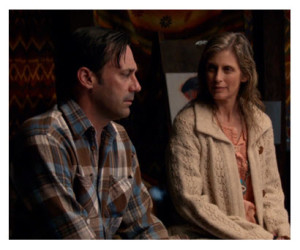 And so we find a beleaguered hero in California, arriving on the doorstep of Anna Draper’s niece Stephanie. This plot twist, entirely believable, leads to him accompanying her up the coast to the retreat where he is supposed to clear his head and explore his feelings. But talk about a fish out of water! The depth of Don’s hurt and his fall back position on cynicism is well captured as he tries to comfort Stephanie, who feels judged by the others at the retreat for having handed over her child to its grandparents.
And so we find a beleaguered hero in California, arriving on the doorstep of Anna Draper’s niece Stephanie. This plot twist, entirely believable, leads to him accompanying her up the coast to the retreat where he is supposed to clear his head and explore his feelings. But talk about a fish out of water! The depth of Don’s hurt and his fall back position on cynicism is well captured as he tries to comfort Stephanie, who feels judged by the others at the retreat for having handed over her child to its grandparents.
Don, wanting to somehow fix things for her, espouses his credo:
You don’t know what happens to people when they believe in things… You can put this behind you. It will get easier as you move forward.
And to that, Stephanie has a response Don isn’t used to hearing. But then, to her, he isn’t Don, as she says:
Oh Dick. I don’t think you’re right about that.
Don is the one who believed — that he could recreate himself and leave the past behind, that he could fill himself up enough to compensate for his terrible childhood, that he could “fix” things for others and therefore maybe fix himself.
Finding a Happy Beginning
Skipping forward to the very end of the episode, in which we see that Dick Whitman and Don Draper have found peace, I am trying to recall which of Don’s many women it was who said “I hope you find peace.”
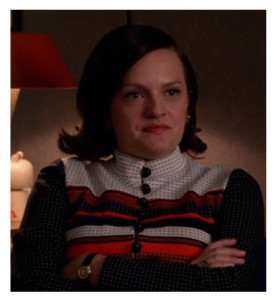 That Matt Weiner didn’t kill off our hero, but instead gave him this open-ended happy beginning — the opportunity to start over yet again — feels like a kindness to the audience.
That Matt Weiner didn’t kill off our hero, but instead gave him this open-ended happy beginning — the opportunity to start over yet again — feels like a kindness to the audience.
However, the story’s creators didn’t bring Don to this moment easily, and the clarity with which he sums up his own sins, as he makes a farewell telephone call to Peggy, is like the confessor to the priest. It is a wrenching scene that nonetheless includes classic Mad Men wit:
Peggy: “You can come home.”
Don: “Where?”
Peggy: “McCann will take you back.”
And though Peggy even says “Don’t you want to work on Coke?” — a delightful touch — Don offers his litany of transgressions:
I’m not the man you think I am… I broke all my vows. I scandalized my child. I took another man’s name… and made nothing of it.
Heartbreaking!
When one of the retreat’s leaders takes Don back into a session, and an innocuous “every man” explains at length how he feels invisible, Don has an epiphany. However horrible his childhood, his desire to be loved is universal. The something “more” he seems to have been searching for, including what he couldn’t articulate in trying to define the SC&P future, is what most people are looking for — to feel good enough, to feel loved, to make a real connection.
Anyone for a chorus of “The Real Thing?”
Nice Resolutions or Too Pat?
Person to Person is an apt title for this goodbye episode, as Don’s long distance calls to Betty and Peggy are both “person to person” and frequently, our most important dealings take place in intimate, one-on-one conversations. So too do we witness other highly personal storyline resolutions: Peggy and Stan in an amusing exchange in which they eventually profess to love each other, Roger and Marie in a few brief but entertaining scenes in which we know they are to be married, and Joan, whose love life isn’t going according to plan.
Mrs. Harris has met a man she wants in her life, but typical of the times — and dare I say, still all too prevalent in 2015 — he wants no competition. Not only is there her son, Kevin, but she starts her own production company making industrial films. We know she will succeed (and love it), but Richard exits from Joanie’s life.
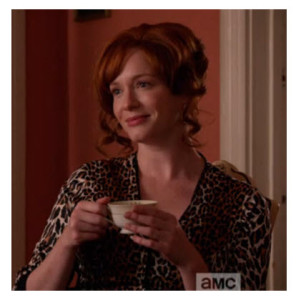 I admit to being disappointed that Richard was so small a man, though I wasn’t surprised and his actions were true to the times and character. However, the Stan-Peggy love match felt a little too pat for my taste.
I admit to being disappointed that Richard was so small a man, though I wasn’t surprised and his actions were true to the times and character. However, the Stan-Peggy love match felt a little too pat for my taste.
Believable? Sure. But the rom-com touch wasn’t to my liking.
On the other hand, I don’t mind seeing Pete say his goodbyes to Peggy, and head off to Wichita with his reunited family in a Leer jet, while Roger and Marie seem like a combustible and excellent match!
Taking us out with panache is Matt Weiner’s suggested link between Don and one of the most famous and successful commercials ever — “The Real Thing” — which presents young people on a hilltop very reminiscent of the times and Don’s getaway. They sing their hearts out in a jubilant and earnest refrain that includes these words:
I’d like to buy the world a home and furnish it with love.
That, too, sounds like the “real thing” when it comes to the fundamental dream of Dick-turned-Don.
The wink in all of this, of course, like the series itself… that it may be Don, or someone like him, who turns that experience to commercial benefit.
A Final(e) Note
We have loved these characters and their stories for nearly eight years. Saying goodbye is like putting down an epic novel that has held us through sweeping historic change and personal dramas. And the women! When is the last time you saw so many complex, interesting, compelling and smart women in a television drama?
Ultimately, it is the “person to person” connections that we are likely to recall, feeling as if we have lived these scenes with people we care about. We see ourselves and our possibilities; we see our failures and our triumphs, our weaknesses and our strengths.
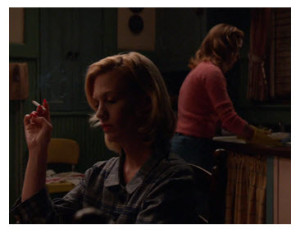 Throughout Mad Men, many of us relived moments of our childhood or young adulthood, and we have felt nostalgic, wistful, sentimental. We are also dealt the realities of the rampant sexism, racism, homophobia and antisemitism that narrowed the options of millions in our prosperous land of plenty.
Throughout Mad Men, many of us relived moments of our childhood or young adulthood, and we have felt nostalgic, wistful, sentimental. We are also dealt the realities of the rampant sexism, racism, homophobia and antisemitism that narrowed the options of millions in our prosperous land of plenty.
So what will we remember?
What will you remember?
Some of the moments I’m unlikely to forget are these: Don finally confessing who he is to Betty; Don and Peggy in The Suitcase, as he lays his head on her lap; Don kissing Peggy’s hand in tender homage as she leaves the agency. And then there is Joan in so many moments of resolve and strength, and Sally, stepping up in one of the series’ last scenes, standing at the sink washing dishes. She has become the adult in the room as contrasted with her often blindly selfish, child-like mother.
And let’s take a moment to ponder Dick Whitman’s ambiguous little smile — or is it Don’s? — certainly the “real thing” as he sits on a California hilltop, imagining what comes next.
Learn more about Coke’s “The Real Thing” commercial here.
 Images courtesy AMC TV.
Images courtesy AMC TV.
Be sure to check Mad Men Reviews weekly, or bookmark Entertainment / Mad Men.
You May Also Enjoy
Overall, I thought it was a good finale and suggesting that Don came up with Coke’s iconic commercial is a fitting end to the show. Peggy and Stan’s ending was the only blight on the episode, too contrived and pat for me.
For me the show highlighted how far we have come since the 60’s and how much is unfortunately still the same. The writers should be proud of that accomplishment.
Overall I agree with Batticus. I was happy with the finale. One reviewer said something like it was Weiner’s farewell love note to viewers (or something like that). I was already pretty sure about what Joan would do given she left McCann Ericson with her rolodex under her arm.
The saddest thing for me was Sally at home washing dishes while her mother sat at the kitchen table smoking. According to Wikipedia, Sally is one year older than I am so at 16, she was the exact same age I was when my mother was diagnosed with cancer. Although my mother was nothing like Betty, I could certainly identify with what Sally was going through.
What can I say, I laughed out loud when that old Coke theme started playing over Don’s smirk. He was not a character who grew and developed.
But I love what Weiner did for the women and he clearly loves women. I don’t know if you noticed, but in the penultimate episode, when Joan is threatening her new boss, she brings up the Newsweek lawsuit that was documented in Lynn Povich’s book, The Good Girls Revolt.
I’ll miss your weekly posts, D.A., as much as I’ll miss the show. Thank you for keeping me up-to-date on all things Mad Men.
This evening I was able to read some wonderful reviews around the web that were insightful and impeccably written. There is always so much to explore with these characters and their story lines, and barely time to touch on a few elements given an hour of putting one’s thoughts down. Like you, Judith, I worry about Sally. I can only imagine that she will spend years on the therapist’s couch, and with all of Don’s flaws, he is so much more capable of warmth than his ex-wife, I like to imagine that after becoming the fictional Bill Backer (the real ad exec who came up with the Coke commercial), Don will find his way back into his children’s lives… and stay there.
Even Betty referred to him as a good father, despite her remarks on the phone in the final episode regarding how little he had seen them recently.
To your point, wouldn’t it be lovely to see what Weiner would do with more complex female characters?
And thanks for reading my musings on this show. Hard to believe that it’s over!
You’ve written so eloquently and passionately about the entire show: namaste & Thank You… Om 🙂
Om indeed! I was thinking about you just yesterday, Bruce. Lovely to hear from you, and hoping you and your family are well.